20 start with M start with M

The United States Marine Corps has a unique culture that ensures comradery, exacting standards, and readiness to be the first to every fight. Yet even in a group that is known for innovation, culture can push leaders to fall back on ingrained preferences. Jeannie L. Johnson takes a sympathetic but critical look at the Marine Corps's long experience with counterinsurgency warfare. Which counterinsurgency lessons have been learned and retained for next time and which have been abandoned to history is a story of battlefield trial and error—but also a story of cultural collisions.
The book begins with a fascinating and penetrating look inside the culture of the Marine Corps through research in primary sources, including Marine oral histories, and interviews with Marines. Johnson explores what makes this branch of the military distinct: their identity, norms, values, and perceptual lens. She then traces the history of the Marines' counterinsurgency experience from the expeditionary missions of the early twentieth century, through the Vietnam War, and finally to the Iraq War. Her findings break new ground in strategic culture by introducing a methodology that was pioneered in the intelligence community to forecast behavior. Johnson shows that even a service as self-aware and dedicated to innovation as the Marine Corps is constrained in the lessons-learned process by its own internal predispositions, by the wider US military culture, and by national preferences. Her findings challenge the conclusions of previous counterinsurgency scholarship that ignores culture. This highly readable book reminds us of Sun Tzu's wisdom that to be successful in war, it is important to know thyself as well as the enemy. This is a must-read for anyone interested in the Marines Corps, counterinsurgency warfare, military innovation, or strategic culture.
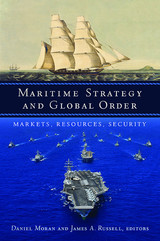
Taken for granted as the natural order of things, peace at sea is in fact an immense and recent achievement—but also an enormous strategic challenge if it is to be maintained in the future. In Maritime Strategy and Global Order, an international roster of top scholars offers historical perspectives and contemporary analysis to explore the role of naval power and maritime trade in creating the international system.
The book begins in the early days of the industrial revolution with the foundational role of maritime strategy in building the British Empire. It continues into the era of naval disorder surrounding the two world wars, through the passing of the Pax Britannica and the rise of the Pax Americana, and then examines present-day regional security in hot spots like the South China Sea and Arctic Ocean. Additional chapters engage with important related topics such as maritime law, resource competition, warship evolution since the end of the Cold War, and naval intelligence.
A first-of-its-kind collection, Maritime Strategy and Global Order offers scholars, practitioners, students, and others with an interest in maritime history and strategic issues an absorbing long view of the role of the sea in creating the world we know.

New essays in this expanded volume include a reflection by former President Jimmy Carter on the causes of war and their links to human suffering, a prophetic analysis of the post-Cold War environment in the Mediterranean by former U.N. Secretary General Boutros-Boutros Ghali, an essay on the strategic significance of Turkey in the eastern Mediterranean by the former Turkish ambassador to the United States, and, in light of recent events in Kosovo and elsewhere in the former Yugoslavia, a piece on the issue of Balkan security by the editor. Introducing the volume is a foreword by former U.S. Secretary of State George P. Schultz and an essay focusing on NATO in the Mediterranean by Javier Solana, the Secretary General of NATO. Central to the Mediterranean debate is the question of NATO’s role in its future. Some contributors suggest that the southward expansion of NATO could be an important first step toward stability, while others argue that the Mediterranean should be treated as an integrated geostrategic region, with a central place in Western security considerations. Other essays discuss the comparative experience of UNPROFOR and IFOR in the former Yugoslavia; the role of Italy in the future of the Mediterranean; the economic challenges facing the Middle East; and the role of Israel and its relationship to its neighbors.
Mediterranean Security at the Crossroads is one of the first in-depth looks at this region from a strictly post-Cold War perspective.
Contributors. Hanan Bar-On, Ted Galen Carpenter, Jimmy Carter, Charles G. Cogan, Gregorios Demestichas, Boutros-Boutros Ghali, Carlo Jean, Nuzhet Kandemir, Nicolai A. Kovalsky, William H. Lewis, Peter H. Liotta, John A. MacInnis, Phebe Marr, Matthew Nimetz, George P. Schultz, Javier Solana, Richard F. Staar, Nikolaos A. Stavrou, George Vella, W. Bruce Weinrod
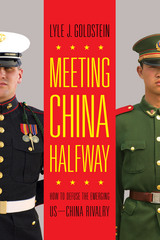
Though a US-China conflict is far from inevitable, major tensions are building in the Asia-Pacific region. These strains are the result of historical enmity, cultural divergence, and deep ideological estrangement, not to mention apprehensions fueled by geopolitical competition and the closely related “security dilemma.”
Despite worrying signs of intensifying rivalry, few observers have provided concrete paradigms to lead this troubled relationship away from disaster. This book is dramatically different in that Lyle J. Goldstein’s focus is on laying bare both US and Chinese perceptions of where their interests clash and proposing new paths to ease bilateral tensions through compromise. Each chapter contains a “cooperation spiral” —the opposite of an escalation spiral—to illustrate these policy proposals. Goldstein makes one hundred policy proposals over the course of this book to inaugurate a genuine debate regarding cooperative policy solutions to the most vexing problems in US-China relations.
Goldstein not only parses findings from American scholarship but also breaks new ground by analyzing hundreds of Chinese-language sources, including military publications, never before evaluated by Western experts. Meeting China Halfway, new in paperback, remains a refreshing and unique contribution to the study of the world’s most important bilateral relationship.
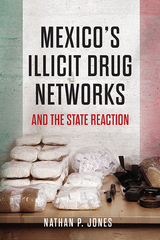
Mexican drug networks are large and violent, engaging in activities like the trafficking of narcotics, money laundering, extortion, kidnapping, and mass murder. Despite the impact of these activities in Mexico and abroad, these illicit networks are remarkably resilient to state intervention.
Drawing on extensive fieldwork and interviews with US and Mexican law enforcement, government officials, organized crime victims, and criminals, Nathan P. Jones examines the comparative resilience of two basic types of drug networks—“territorial” and “transactional”—that are differentiated by their business strategies and provoke wildly different responses from the state. Transactional networks focus on trafficking and are more likely to collude with the state through corruption, while territorial networks that seek to control territory for the purpose of taxation, extortion, and their own security often trigger a strong backlash from the state.
Timely and authoritative, Mexico's Illicit Drug Networks and the State Reaction provides crucial insight into why Mexico targets some drug networks over others, reassesses the impact of the war on drugs, and proposes new solutions for weak states in their battles with drug networks.
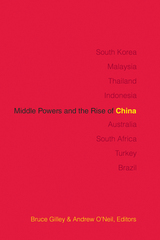
China’s rise is changing the dynamics of the international system. Middle Powers and the Rise of China is the first work to examine how the group of states referred to as “middle powers” are responding to China’s growing economic, diplomatic, and military power. States with capabilities immediately below those of great powers, middle powers still exercise influence far above most other states. Their role as significant trading partners and allies or adversaries in matters of regional security, nuclear proliferation, and global governance issues such as human rights and climate change are reshaping international politics.
Contributors review middle-power relations with China in the cases of South Korea, Malaysia, Thailand, Indonesia, Australia, South Africa, Turkey, and Brazil, addressing how these diverse nations are responding to a rising China, the impact of Chinese power on each, and whether these states are being attracted to China or deterred by its new power and assertiveness. Chapters also explore how much (or how little) China, and for comparison the US, value middle powers and examine whether or not middle powers can actually shape China’s behavior. By bringing a new analytic approach to a key issue in international politics, this unique treatment of emerging middle powers and the rise of China will interest scholars and students of international relations, security studies, China, and the diverse countries covered in the book.
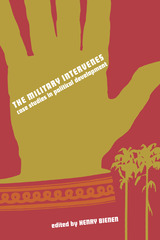
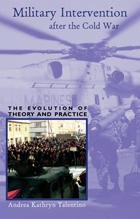
For hundreds of years, military intervention in another country was considered taboo and prohibited by international law. Since 1992, intervention has often been described as an international responsibility, and efforts have been made to give it legal justification. This extraordinary change in perceptions has taken place in only the space of a decade.
Military Intervention after the Cold War: The Evolution of Theory and Practice explores how and why this change took place, looking at how both ideas and actions changed in the post-Cold War period to make military intervention a tool of international security and a defining characteristic of the international system. Although intervention is often touted as a strategy to rebuild collapsed states, successful interventions are rare. Andrea Kathryn Talentino argues that standards of human rights and responsible governance have become part of the definition of international security. She addresses questions that are vital in the post-9/11 world, where weak and collapsed states are recognized as permissive and at times supportive environments for criminal actors.
The specter of terrorism has further emphasized the need to understand why military intervention is undertaken and how it could be more effective. Scholars, graduate and undergraduate students, and readers interested in understanding global interdependence will find Military Intervention after the Cold War an indispensable book.

Military Intervention After the Cold War explores how and why this change took place, looking at how both ideas and actions changed in the post-Cold War period to make military intervention a tool of international security and a defining characteristic of the international system. Although it is often touted as a strategy to rebuild collapsed states, the examples of success are few and far between. Andrea Kathryn Talentino argues that standards of human rights and responsible governance have become part of the definition of international security. She addresses questions that are vital in the post-9/11 world, where weak and collapsed states are recognized as permissive and at times supportive environments for criminal actors.
The specter of terrorism has placed even greater emphasis on the need to understand why military intervention happens and how it could be more effective. With the news full of stories on intervention and nation-building, scholars, graduate and undergraduate students, and readers interested in understanding global interdependence will find Military Intervention After the Cold War an indispensable book.Andrea Kathryn Talentino is an assistant professor of international relations at Tulane University, New Orleans.The author of numerous articles on military intervention and post- conflict rebuilding, she is currently focusing on the link between nation-building and political violence.

Military Strategy, Joint Operations, and Airpower will introduce readers to contemporary strategy and the operational level of war, particularly as it relates to airpower.
This intermediate textbook was developed as required reading for all US Air Force Academy cadets, and is designed to close the gap between military theory and military practice. It asks readers to reconceive of the military as a “profession of effects” rather than as a profession of arms because much of the military's work and impact no longer involves kinetic warfare.
The book covers strategic foundations; operational design and joint-service operations; the air, space, and cyber capabilities that make up modern airpower; and contemporary challenges in the application of strategy. The contributing authors include both military practitioners and scholars of security studies, political science, and history.
In addition to being required reading for Air Force Academy cadets, the book will provide an essential overview of strategy and practice for anyone interested in modern airpower and the joint operating environment.

An essential introduction to contemporary strategy at the operational level of war, now in its second edition
Military Strategy, Joint Operations, and Airpower introduces contemporary strategy at the operational level of war, particularly as it relates to airpower. Developed as foundational reading for all US Air Force Academy cadets, Air Force ROTC students, and Officer Training School candidates, this intermediate textbook is designed to close the gap between military theory and practice. It covers strategic foundations; operational design and joint-service operations; the air, space, and cyber capabilities that comprise modern airpower; and contemporary challenges in the application of strategy.
In this second edition, each chapter has been updated and revised, and several sections have been expanded. Part 2, “Military Forces and the Joint Fight,” now features separate chapters about each service. Similarly, operational design is expanded from one to four chapters to provide a more thorough step-by-step guide through the process. New chapters in this second edition include “Integrating the Instruments of Power,” “The Spectrum of Conflict and Range of Military Operations,” and “The Nuclear Weapons Triad and Missile Defense.”
Military Strategy, Joint Operations, and Airpower’s contributing authors and editors include both military practitioners and scholars of security studies, political science, and history. In addition to being required reading for US Air Force cadets, the book provides an essential overview of strategy and practice for anyone interested in modern airpower.
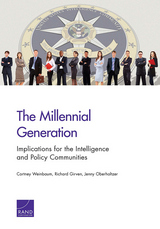
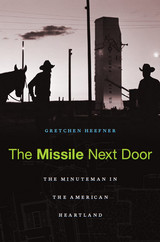
Between 1961 and 1967 the United States Air Force buried 1,000 Minuteman Intercontinental Ballistic Missiles in pastures across the Great Plains. The Missile Next Door tells the story of how rural Americans of all political stripes were drafted to fight the Cold War by living with nuclear missiles in their backyards—and what that story tells us about enduring political divides and the persistence of defense spending.
By scattering the missiles in out-of-the-way places, the Defense Department kept the chilling calculus of Cold War nuclear strategy out of view. This subterfuge was necessary, Gretchen Heefner argues, in order for Americans to accept a costly nuclear buildup and the resulting threat of Armageddon. As for the ranchers, farmers, and other civilians in the Plains states who were first seduced by the economics of war and then forced to live in the Soviet crosshairs, their sense of citizenship was forever changed. Some were stirred to dissent. Others consented but found their proud Plains individualism giving way to a growing dependence on the military-industrial complex. Even today, some communities express reluctance to let the Minutemen go, though the Air Force no longer wants them buried in the heartland.
Complicating a red state/blue state reading of American politics, Heefner’s account helps to explain the deep distrust of government found in many western regions, and also an addiction to defense spending which, for many local economies, seems inescapable.

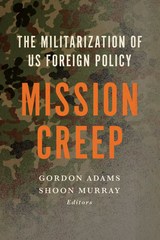
Mission Creep: The Militarization of US Foreign Policy? examines the question of whether the US Department of Defense (DOD) has assumed too large a role in influencing and implementing US foreign policy. After the Cold War, and accelerating after September 11, the United States has drawn upon the enormous resources of DOD in adjusting to the new global environment and challenges arising from terrorism, Islamic radicalism, insurgencies, ethnic conflicts, and failed states.
Contributors investigate and provide different perspectives on the extent to which military leaders and DOD have increased their influence and involvement in areas such as foreign aid, development, diplomacy, policy debates, and covert operations. These developments are set in historical and institutional context, as contributors explore the various causes for this institutional imbalance. The book concludes that there has been a militarization of US foreign policy while it explores the institutional and political causes and their implications.
“Militarization” as it is used in this book does not mean that generals directly challenge civilian control over policy; rather it entails a subtle phenomenon wherein the military increasingly becomes the primary actor and face of US policy abroad. Mission Creep’s assessment and policy recommendations about how to rebalance the role of civilian agencies in foreign policy decision making and implementation will interest scholars and students of US foreign policy, defense policy, and security studies, as well as policy practitioners interested in the limits and extents of militarization.
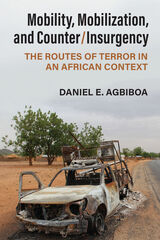
In Mobility, Mobilization, and Counter/Insurgency, Daniel Agbiboa takes African insurgencies back to their routes by providing a transdisciplinary perspective on the centrality of mobility to the strategies of insurgents, state security forces, and civilian populations caught in conflict. Drawing on one of the world’s deadliest insurgencies, the Boko Haram insurgency in northeast Nigeria and the Lake Chad region, this well-crafted and richly nuanced intervention offers fresh insights into how violent extremist organizations exploit forms of local immobility and border porosity to mobilize new recruits, how the state’s “war on terror” mobilizes against so-called subversive mobilities, and how civilian populations in transit are treated as could-be terrorists and subjected to extortion and state-sanctioned violence en route. The multiple and intersecting flows analyzed here upend Eurocentric representations of movement in Africa as one-sided, anarchic, and dangerous. Instead, this book underscores the contradictions of mobility in conflict zones as simultaneously a resource and a burden. Intellectually rigorous yet clear, engaging, and accessible, Mobility, Mobilization, and Counter/Insurgency is a seminal contribution that lays bare the neglected linkages between conflict and mobility.
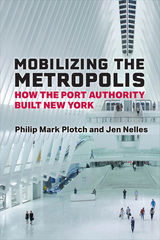
The Port Authority of New York and New Jersey has morphed in ways that would be unrecognizable to its founders. Its mission evolved from improving rail freight to building motor vehicle crossings, airports, office towers, and industrial parks and taking control of a failing commuter rail line. In its early years, the agency was often viewed with admiration; however as it drew up plans, negotiated to take control of airfields and marine terminals, and constructed large bridges and tunnels, the Port Authority became the object of less favorable attention. It was attacked as a “super-government” that must be reined in, while the mayors of New York and Newark argued that it should be broken up with its pieces given to local governments for their own use.
Despite its criticisms and travails, for over half a century the Port Authority overcame hurdles that had frustrated other public and private efforts, built the world's longest suspension bridge, and took a leading role in creating an organization to reduce traffic delays in the New York-New Jersey region. How did the Port Authority achieve these successes? And what lessons does its history offer to other cities and regions in the United States and beyond? In a time when public agencies are often condemned as inefficient and corrupt, this history should provide some positive lessons for governmental officials and social reformers.
In 2021, the Port Authority marked its 100th birthday. Its history reveals a struggle between the public and private sectors, the challenges of balancing democratic accountability and efficiency, and the tension between regional and local needs. From selected Port Authority successes and failures, Philip Mark Plotch and Jen Nelles produce a significant and engaging account of a powerful governmental entity that offers durable lessons on collaboration, leadership, and the challenge of overcoming complex political challenges in modern America.

Throughout the twentieth century, the United States did not experience national security domestically; it defended its borders by conducting military, foreign policy, and intelligence operations internationally, and then separated these activities from domestic law enforcement with bright legal lines. In the twenty-first century, U.S. national security no longer occurs exclusively outside of the nation. The U.S. government is beginning to respond to this change, and the establishment of the Department of Homeland Security is merely the first step in an organizational and strategic realignment that will be a long, difficult, and mistake-filled process. More or Less Afraid of Nearly Everything is an accessible and engaging guide to homeland security, particularly migration and border security, that makes innovative arguments about the American government and keeping citizens safe, and provides practical solutions to real-world problems.
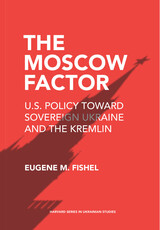
In 2014, Russia illegally annexed Crimea, bolstered a separatist conflict in the Donbas region, and attacked Ukraine with its regular army and special forces. In each instance of Russian aggression, the U.S. response has often been criticized as inadequate, insufficient, or hesitant.
The Moscow Factor: U.S. Policy toward Sovereign Ukraine and the Kremlin is a unique study that examines four key Ukraine-related policy decisions across two Republican and two Democratic U.S. administrations. Eugene M. Fishel asks whether, how, and under what circumstances Washington has considered Ukraine’s status as a sovereign nation in its decision-making regarding relations with Moscow.
This study situates the stance of the United States toward Ukraine in the broader context of international relations. It fills an important lacuna in existing scholarship and policy discourse by focusing on the complex trilateral—rather than simply bilateral—dynamics between the United States, Ukraine, and Russia from 1991 to 2016. This book brings together for the first time documentary evidence and declassified materials dealing with policy deliberation, retrospective articles authored by former policymakers, and formal memoirs by erstwhile senior officials. The study is also supplemented by open-ended interviews with former and returning officials.
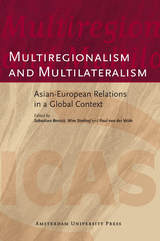
READERS
Browse our collection.
PUBLISHERS
See BiblioVault's publisher services.
STUDENT SERVICES
Files for college accessibility offices.
UChicago Accessibility Resources
home | accessibility | search | about | contact us
BiblioVault ® 2001 - 2024
The University of Chicago Press









